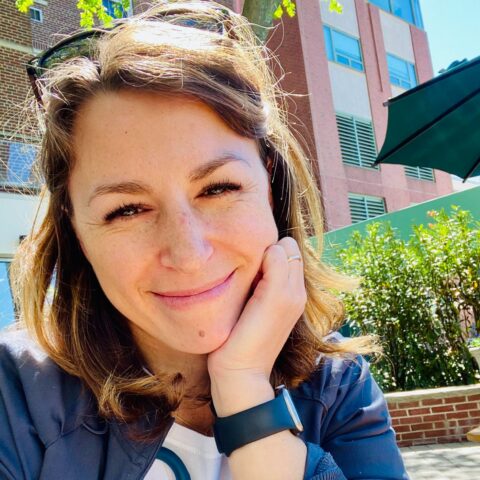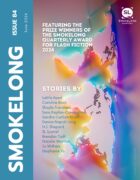Placing this story in a playground that is too big for the toddler feels fitting for this overwhelmed new mother. Can you speak on how you chose this environment, and what it does for the story?
Some writers have a great gift for world building. They can create characters and settings and stories from nothing. I do not have that gift. I almost don’t know how else to write fiction except to take from life and alter it. I can’t even change the names, usually. It’s a failure of imagination, I guess, but it also makes me alert to the possibility of stories everywhere, from almost everything that happens in my life or that I hear about happening in someone else’s life.
And so, like almost every piece of fiction I’ve written in the last few years, this story is based on real life, with details and the ending changed to suit my purposes. I did take my young son, Tom, to a strange playground near the hospital a few days after giving birth to another son who was, in fact, in the NICU. And Tom did have an extremely annoying hamster toy that repeated everything he said. And it did get lost in a strange maze of shrubbery. The rest is invented. I didn’t choose the setting except in the fact that I chose this story.
What is the significance behind Tom and Hello being the only characters with names?
I hardly ever write from the tight third-person POV that I employed in this story, but I think that distance made it easier to have some really physical, literal descriptions of what a postpartum body looks and feels like. In the tight third, the name of the main character really doesn’t come up unless it’s spoken by someone else, and neither Hello nor Tom were going to say her name.
One of the most visceral moments in this story is when Hello starts repeating the woman’s words from the bushes. In your opinion, how does hearing her own voice affect the woman?
Most people have a picture in their minds of what they look and sound like, of how they’re coming across, but much of the tension and conflict and drama in our everyday lives comes from the fact that we are actually not looking and sounding and coming across that way to other people. When you hear your own voice as it really sounds, different from the way you think it sounds, it shocks you into the realization that other minds are not experiencing the world the same way that you are. In the case of the woman in the story, hearing herself scared, and angry, and sad, aligns her with her children—that’s how they sound to her, and how she must sound to them, too.
The maze represents something different for each character and for the reader—could you expand on the maze, and why it is so thematically important to this story?
So much of parenting (for this parent, anyway) feels like being lost without a map. You think you know where you’re going, you think you’ve been down this path before, and then—oh, shit! This path is actually nothing like the other path! Or you think you’ve turned a corner, you’re in some new territory at last, and then—Bam!—you’re back where you started. In the end, it’s all coming back to the same place, this place of wanting…actually, needing … to do right by your children. But we don’t always know how to get there.
The story ends in chaos—Hello is lost, the woman’s stitches have ripped, and Tom fell from the playground. How did you craft this last line, delivered by Hello, to “Stay … Please, please,” and what does it mean for these characters’ fates?
I recently read something by a mother who had a miscarriage. When she thought she might be losing the baby, she wrote that she was praying only for the baby to Stay, please stay. As if that child goes somewhere else. I read that piece after I wrote this story, but the line resonated so much with me, because I think that’s what most parents feel, that if we can just keep our children close, keep them with us, we can keep them safe. Of course, that’s not true—in the case of miscarriage, obviously, the child couldn’t be any closer. We simply cannot always protect them. We fail them in that, our most basic parental duty, again and again.
But that’s the nature of motherhood, and of parenting in general—our maternal bodies and our parental capabilities fail our children over and over, but each failure of ours hopefully paves the way for them to become stronger themselves, “hopefully” being the operative word. Hopefully Tom is okay, and the baby is okay, and Hello is found, but that’s all we can do: hope.



 The core workshop of SmokeLong Fitness is all in writing, so you can take part from anywhere at anytime. We are excited about creating a supportive, consistent and structured environment for flash writers to work on their craft in a community. We are thrilled and proud to say that our workshop participants have won, placed, or been listed in every major flash competition. Community works.
The core workshop of SmokeLong Fitness is all in writing, so you can take part from anywhere at anytime. We are excited about creating a supportive, consistent and structured environment for flash writers to work on their craft in a community. We are thrilled and proud to say that our workshop participants have won, placed, or been listed in every major flash competition. Community works.